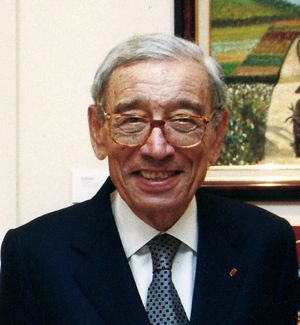Boutros Boutros-Ghali
 | ||||||||||||||
| Born | بطرس بطرس غالي 14 November 1922 Cairo, Kingdom of Egypt | |||||||||||||
| Alma mater | Cairo University, Pantheon-Sorbonne University, Sciences Po | |||||||||||||
| Religion | Coptic Orthodox Christianity | |||||||||||||
| Spouse | Leia Maria Boutros-Ghali | |||||||||||||
| Party | Arab Socialist Union, National Democratic Party, Independent | |||||||||||||
"The UN Secretary General the West Loved to Hate"
| ||||||||||||||
Boutros Boutros-Ghali was an Egyptian politician and diplomat who was the sixth Secretary-General of the United Nations from 1992 to 1996, when he was ousted after the US vetoed a second term[1]. Prior to his appointment as secretary-general, Boutros-Ghali was the acting Minister of Foreign Affairs of Egypt between 1977 and 1979.
Deposing
In 1996 when the United States single-handedly browbeat the other fourteen then members of the Security Council to depose Secretary General Boutros Boutros-Ghali and replace him with Kofi Annan, who the preceding year had been appointed UN special envoy to NATO and authorized the NATO bombing in Bosnia behind the back of Boutros-Ghali.
Boutros-Ghali was deprived of the traditional second term for not authorizing NATO's bombing of Bosnian Serb targets in 1995 and for speaking the truth about the deadly Israeli bombing of a refugee camp in Qana, Lebanon in the following year when 106 civilians were killed and 116 injured.[2]
Former Clinton and Bush administrations' National Security Council counter-terrorism adviser Richard Clarke told how:
[Madeleine] Albright and I and a handful of others (Michael Sheehan, Jamie Rubin) had entered into a pact together in 1996 to oust Boutros-Ghali as Secretary General of the United Nations, a secret plan we had called Operation Orient Express, reflecting our hope that many nations would join us in doing in the UN head.
In the end, the US had to do it alone (with its UN veto) and Sheehan and I had to prevent the President from giving in to pressure from world leaders and extending Boutros-Ghali’s tenure, often by our racing to the Oval Office when we were alerted that a head of state was telephoning the President. In the end Clinton was impressed that we had managed not only to oust Boutros-Ghali but to have Kofi Annan selected to replace him.[3]